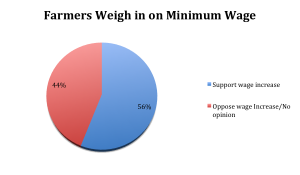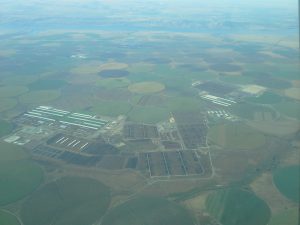
The February 2016 Legislative ‘short session’ has come and gone. Lasting just one month, a number of bills with impacts on agriculture in Oregon were discussed, some passing, some not. FoFF waged a major effort early in the session to address long-standing problems with poorly regulated Genetically Engineered (GE) crops, then wrapped it up by fighting an extension of tax subsidies for Oregon’s largest factory farm during the legislature’s waning days.
Below is a recap of some of the most significant legislation impacting family farmers discussed in February 2016.
Regulation of Genetically Engineered Seeds and Crops – Coming in to the February session, FoFF partnered with Our Family Farms Coalition, Center for Food Safety and others to try and convince the Legislature to repeal a 2013 law and pass HB 4122 to allow local restrictions on genetically engineered (GE) crops in order to protect Oregon’s non-GE farmers from the risks of contamination of their seed and other crops.

After more than two years of inaction by the Oregon Department of Agriculture and the Legislature to chart out state-level farmer protections, we decided to make another push to address the need for GE regulations in the state. As a reminder, in late 2013, the Legislature ‘pre-empted’ local restrictions (with the exception of a GE crop ban already on the ballot in Jackson County). And along with that pre-emption came promises from then Governor Kitzhaber and many legislators that Oregon would enact state level GE rules to protect at-risk farmers.
Despite hearing a large volume of supportive testimony from farmers, organic industry representatives, and sustainable agriculture organizations in favor of allowing local regulation of GE crops, the House Committee on Consumer Protection declined to let the bill out of committee with this language in it. Instead, in response to the recent federal approval of a fast-growing genetically engineered salmon, the committee modified the bill to require labeling of GE fish sold for human consumption in Oregon. While the House passed this bill in a 32-27 vote, it died in the Senate.
Minimum Wage Increases – Facing proposals to raise Oregon’s minimum wage via ballot measure this fall, the Legislature decided to pass its own minimum wage increase. In order to accommodate rural and agricultural concerns, the bill phases in wage increases more slowly than the ballot measures would have, and creates three different minimum wages in Oregon, with the highest located in urban areas. While some farmers and ag groups strongly opposed any wage increase, FoFF was neutral on the fast-moving minimum wage proposal because we have heard a wide range of perspectives from our farmers on the topic.

Many farmers we’ve spoken to actually support increasing the minimum wage (see chart at right), but some have also expressed concern that if these increases come too quickly it will be difficult for them to accommodate. Labor costs can already be quite high on many smaller farms that employ seasonal or permanent workers. In the context of these challenges, the three tiered proposal that passed the Legislature appears to do a good job addressing agricultural and rural concerns, while gradually increasing wages for the lowest paid workers.
Under the new law, the minimum wage (currently at $9.25/hour) will go up in July 2016 by $.50 to $9.75/hour inside the urban growth boundary (UGB) at the edge of Portland, and up $.25 to $9.50/hour in several ‘mid-sized’ counties including those in the Willamette Valley, the North Coast, and Deschutes, Hood River, Jackson, and Josephine Counties, and also in 18 more remote ‘frontier’ counties. The minimum wage rate will continue to rise gradually until 2022 when it reaches $14.75 inside the Portland UGB, $13.50 in the ‘mid-sized’ counties, and $12.50 in the more rural ‘frontier’ counties. As a result of the bill’s passage, campaigns to pass separate ballot measures for statewide $15/hour and $13.50/hour minimum wages have now been abandoned.
In the final few days of the session, proposals to create a tax credit for farms, agricultural, and food businesses to help them adjust to the minimum wage increases were discussed. However, efforts to limit these credits to smaller farm and food businesses were opposed by groups representing large food processors and large agricultural operations and the Legislature did not act on that item. This tax credit proposal will likely be discussed again by the Legislature in 2017, and if carefully crafted could help smaller farms that may struggle to meet some of the wage increases.
Urban Growth Boundary Expansion Pilot Project – Complaints over a lack of affordable housing in Oregon were the impetus for a land use pilot project bill passed by the Legislature in February. The legislation allows the Land Conservation Development Commission (LCDC) to approve two pilot projects for expanding urban growth boundaries (UGBs) by 50 acres each if developments are for the purpose of meeting identified affordable housing needs, one in a town smaller than 25,000 people, and a second in a city larger than that. Some counties are excluded altogether including Washington, Multnomah, Clackamas, Marion, and Polk, leading some to speculate that planned UGB expansions onto farmland under this pilot could happen outside Eugene or Bend. Many fear that high value farmland will be lost as these two 50 acre pilot projects are established. Farmland protection advocates will need to remain vigilant to ensure that doesn’t happen.

Manure Digester Tax Credits Extended – In the Legislature’s final days, a tax credit bill was revealed that included the extension of controversial payments for manure digesters. This expensive tax credit primarily flows to the state’s largest factory-scale dairy operation, Threemile Canyon Farms, in eastern Oregon. The tax credit, paid at $5 per ‘wet ton’ for manure converted to energy in an anaerobic digester, was set to expire at the end of 2017. Since 2013, it has paid approximately $6 million in taxpayer funds to Threemile after they built a long-promised digester to handle manure from roughly half their cows. Under the bill the legislature eventually passed, the credit was reduced to $3.50/wet ton but extended for five more years, until 2022. If the credit remains unchanged and Threemile does not expand their digester any further, this one operation will receive approximately $9 million in additional taxpayer funds in coming years.
FoFF opposed the manure digester tax credit because it has very limited to negligible environmental benefits, and primarily benefits larger (including Oregon’s largest) confinement livestock operations, that have manure disposal problems not faced by smaller pasture based producers.
A tax subsidy this lucrative could even serve as a recruitment tool for new factory farms to set up shop in Oregon.
We believe the money allocated for this tax credit would be much better spent on other programs, including supporting beginning farmers and sustainable family scale farms.
Industrial hemp – The Legislature moved to clarify Oregon’s industrial hemp rules in February, after long delays and confusion from the Oregon Department of Agriculture. The ODA took nearly six years to begin permitting industrial hemp production after the Legislature first authorized the program in 2009. The original law also included some restrictions that were difficult for hemp growers to meet. Under the bill that passed this year, many of those restrictions on growing hemp have been eliminated, though permits from the Oregon Department of Agriculture are still required.
